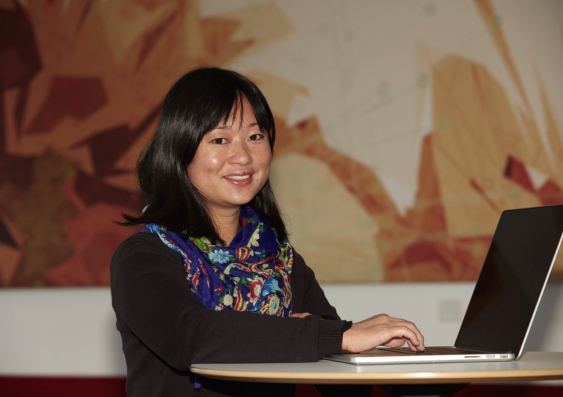As Australia and UNSW’s first recipient of an EMBL Australia fellowship to pursue a joint PhD at the renowned European Molecular Biology Laboratory (EMBL), Simone Li has spent more than three years enjoying the ambiance of the ancient German city of Heidelberg and the scientific camaraderie of working at Europe’s flagship laboratory for life sciences.
Now, the UNSW expert in bioinformatics has also made her own scientific mark, as the first author of a paper published in the prestigious journal Science today, which shows that bacterial compatibility between donor and patient is more important than previously thought in fecal transplantation.
The study – the first in which scientists have been able to track which strains of bacteria from a poo donor take hold in a patient’s gut – could help make this promising approach a valid treatment option for more conditions than at present.
“Ultimately, the goal is to move from a stool transplant to something more manageable, such as a pill,” says Li. “Our new work shows that this is likely going to be a personalised bacterial cocktail, rather than a one-size-fits-all solution.”
The new research by Li and her colleagues is a “total game-changer for the field”, says Professor Marc Wilkins, of the UNSW School of Biotechnology and Biomolecular Sciences (BABS), who is Li’s PhD co-supervisor, along with Dr Peer Bork, strategic head of bioinformatics at EMBL.
Li, who will submit her PhD thesis soon, says that meeting researchers working in a wide range of different areas at EMBL, and attending conferences and talks hosted there, have been highlights of studying in Heidelberg.
“It’s surprising how much you can pick up just by chatting to other PhD students and post-docs over a beer or three,” she says, adding: “We’re in Germany after all.”
On top of this, people at EMBL come from very diverse backgrounds, with everyone bring their own unique traditions.
“I’ve really enjoyed the cultural exchange. And you get a real sense of the history of Heidelberg when you walk through its old town area, where buildings from as early as the 1500s are still standing,” she says.
“But I have also been back to UNSW regularly, to discuss ideas with Marc Wilkins and group leaders in BABS – and to visit the coffee cart, of course.”
Stool transplants – also known as fecal microbiota transplants – involve taking microbes from the poo of a healthy donor and transferring them to the patient’s gut. The hope is that this will help to restore health to patients suffering from conditions where the normal balance of microbes in the gut gets skewed.
The approach has been very successful for treating recurrent Clostridium difficile infections, which can cause life-threatening cases of diarrhoea and are becoming a serious problem in hospitals and healthcare institutes. But for other conditions, like ulcerative colitis, stool transplants have proven much less effective.
The new study, led by Dr Bork and Dr Shinichi Sunagawa at EMBL, could help improve those odds.
The trick, the scientists say, is to look beyond what species of microbes are in a person’s gut, to what strains of each species are present. Most people have E. coli in their gut, for example, but different people have different strains of this species – and some of those strains can cause health issues.
By distinguishing between different strains, the EMBL scientists were able to track if the microbes in a patient’s gut after the treatment were their own or came from the donor.
They found that after a stool transplant, new strains of microbes from the donor were more likely to colonise a patient’s gut if the patient already had that variety.
This implies that if doctors can match donors to patients, the chances of the treatment being a success could improve considerably. Looking at strains rather than species of bacteria could also make the therapy effective in conditions where it isn’t currently working.
“With this method, we can really see if, for example, an antibiotic-resistant strain is replaced by a non-resistant one. So, it could help to design stool transplants to work in other conditions beyond C. difficile,” says team member and microbiologist Professor Willem de Vos, of Wageningen University in the Netherlands and the University of Helsinki in Finland.
The study builds on a clinical trial that looked into the use of stool transplants as a treatment for metabolic syndrome at the Academic Medical Centre in Amsterdam.
Although based on data from only 10 people, the work provides strong indications that donor-patient compatibility is more important than assumed: transplants from one donor led to very different outcomes in three different patients.
Australia became the first associate member of EMBL in 2008 and EMBL Australia was launched in 2010 to take full advantage of this unique membership, including with programs to nurture early-career scientists, such as the EMBL Australia International PhD Fellowship that Li won.
In 2014 a new EMBL Australia node was established at UNSW in the Lowy Institute Cancer Research Centre – the UNSW Centre in Single Molecule Science, which focuses on transforming medicine by providing a molecular perspective on complex biological systems and processes.


